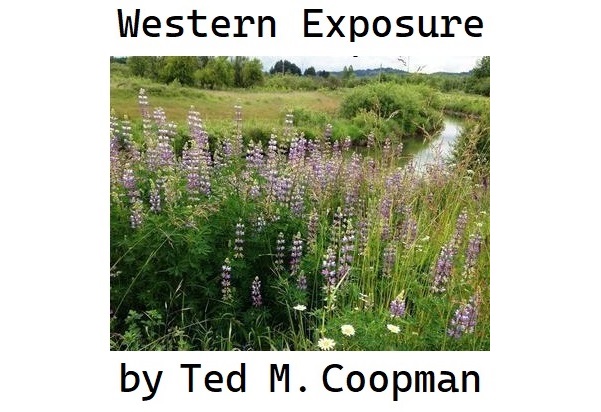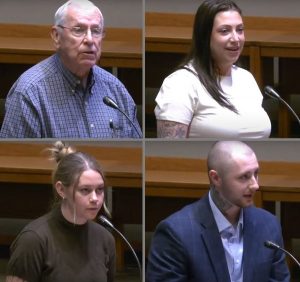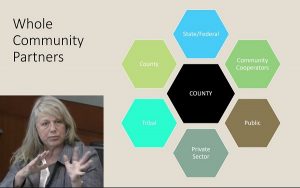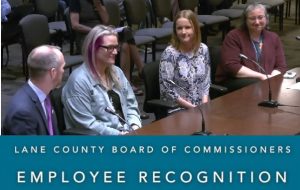We the readers stepped up for Eugene Weekly; now let’s urge EW to step up for us
6 min read
by Ted M. Coopman
Thanks to local and national coverage, mobilization by the Eugene arts community, and (in at least a couple of cases) this humble column, the Eugene Weekly has already netted over $100,000 in contributions. You can contribute here to help EW meet its $188,000 goal.
On its face, this is great news for the survival of locally-owned media. However, it is somewhat problematic when a for-profit business taps private citizens for its continued existence without any sense of reciprocity other than to keep on keeping on.
It’s great to hear a hearty and sincere thank-you and a sense of gratitude for the outpouring of support. But is it enough? I think not.
Business as unusual
I do not see it as blaming the victim to point out that the structure and management of the Eugene Weekly had a significant role in this episode. Exhortations that the business was based on a “culture of trust” do not absolve EW from a lack of oversight.
As the massive influx of unconditional cash illustrated, the EW has responsibilities that exceed its ownership, management, and staff. These responsibilities are at the heart of a media outlet’s First Amendment protections and the considerable privileges we afford a free press. The amnesia concerning this responsibility is one reason we find ourselves in such a political mess nationally and locally.
Trust but verify
Any organization, for-profit or nonprofit, and especially one with employees counting on a paycheck, has a core responsibility to oversee its finances. Trust is intangible, but competent bookkeeping is not. At the very least, issues in accounting should be caught in a yearly review when filing taxes. The inflow and outflow of cash should be subject to oversight by at least two people, one of whom is a manager.
Financial stability, bill paying, and reserves all need careful oversight. The case in point validates the practice.
Clearly, the EW failed in meeting these fiscal responsibilities, as the problems were described as occurring “over years.” At the very least, they owe the public not only a full accounting of what happened, but also an explanation of how they intend to ensure competent management of this critical community resource as they move forward.
They asked the public for help. Now, to respect the help given, the EW needs to be clear about how they will manage donors’ largesse.
Entropy
One thing (of many) that makes me crazy is the reflective call, in the event of failure, for a blood sacrifice. Failures rarely come down to the action or inaction of one person. Failures are usually collaborative and systemic. They surface structural problems that need to be addressed.
While we can heap scorn on an editor or business manager, and certainly a harsh critique may be warranted, the failure is significantly in the system in which they operate. Organizations are formed to execute a goal or mission but that quickly shifts to the perpetuation of the organization itself. Fighting that sort of bureaucratic entropy is essential to the organization’s success and often requires changes in how business gets done.
Organizations that over-rely on individuals, especially founders or long-time managers/editors, are at particular risk because individuals are not reliable. We get old, we step in front of a bus, get distracted, or acquire competing priorities.
For just that reason, we create systems to operate regardless of who is in charge. The EW needs to look at these systems, or their apparent absence, and figure out how to make them future frack-up proof—perhaps delegating responsibility and empowering certain staff (or an external auditor) with oversight duties.
With great power comes great responsibility
While no one person—not even an alleged embezzler—is solely culpable, functional responsibility within the organization is placed 100% on one person: the leader. Like ship captains, any failures that occur on their watch ultimately fall on their shoulders. Whether this one falls on Camilla Mortensen as the editor, Elisha Young as the business manager, or Anita Johnson as owner and president of What’s Happening Incorporated, that leader needs to own it, be clear about how and why the failure occurred, and tell us what is being done to ensure it never happens again.
Their defenestration is not required, but a public mea culpa certainly seems warranted. They owe it to the public, especially to those who coughed up the cash to save our collective butts.
A shakubuku moment
“As informed citizens, we carry a responsibility for community leadership.” -EW Mission Statement
I would hope this experience and the outpouring of support from both supporters and critics would provide a shakubuku moment: A swift, powerful kick to the head that triggers enlightenment—or at least a minor epiphany.
The claim of existing to “boldly question prevailing wisdom and authority” and “expose corporate practices and public policies that benefit the few at the expense of the many,” as enshrined in the Eugene Weekly’s mission statement, are laudable. However, this claim often exists in the breach instead of its practice.
The EW’s spin consistently hews uncritically to the ideological flavor of the month. EW rarely questions the underlying assumptions and often obvious flaws in favor of cheerleading a narrow brand of pseudo-progressivism. The critique is almost exclusively against those who question such assumptions and complicate the party line, providing they get coverage at all.
Pronouncements by city staff, favored activists, and politically-aligned politicians are taken at face value (sometimes fawningly) while critical analysis is reduced to denigration of individuals via broad brush strokes as anti-this or anti-that or possessing certain disqualifying essential qualities.
As a movement activist and community organizer for 30+ years, I have dealt with the press—a lot. My expectations for journalists are very low. I’ve learned that you must be careful of what you say and try and give them what they want—a great visual or a pithy quote or sound bite—and hope for the best. It is the nature of the business.
Yet I remain a staunch defender of those who would misinterpret me. If you are going to go after a journalist, even a hack, you will have to go through me first. Quality journalism should leave everyone with a pre-existing position unsatisfied.
The Eugene Weekly clearly has a left-wing slant for a largely left-wing town and, as a self-identified leftist, that suits me fine. Still, a maxim for honest and useful reportage and commentary is “to be as critical of information and ideas that resonate with you as those you find problematic.” That goes for people too.
The EW would better fulfill its responsibility by surfacing the complexity of local issues—homeless policy, policing, environmentalism, and housing—rather than offering reflexive support for “unicorn ranching” and simplistic solutions that serve no purpose other than to “fluff the auras” of the like-minded.
So, with respect, and for the sake of Eugene and a local press that can meet the moment, I urge readers and supporters to encourage the Eugene Weekly not to waste this crisis but to become the newspaper we collectively need it to be.
Ted M. Coopman’s Dictionary offers the following definition of Unicorn ranching: 1. Expending massive amounts of effort on ideas that will never happen because they are functionally impossible, impractical, or illegal. 2. Belying a complete and at times willful ignorance of the constraints of economic, social, or political policy that undercuts the rancher’s legitimacy in the eyes of decision-makers. 3. Demonstrating a willingness to obstruct meaningful progress on issues over minor emotional or ideological reasons or unrealistic expectations. See also: “Yeah and I want a pony for Christmas and that’s not going to happen either.”
Western Exposure is a semi-regular column that looks at issues and challenges from a West Eugene perspective – a perspective that is often ignored or trivialized by city leadership and influential groups and individuals largely based in south and east Eugene.
Western Exposure rejects the fauxgressive party line, performative politics, and “unicorn ranching” policy in favor of pragmatism focused on the daily experiences of residents and small businesses in Eugene—and West Eugene in particular.
Ted has been involved in neighborhood issues since 2016 as an elected board member, and now chair, of Jefferson Westside Neighbors and has 30+ years experience as an activist and community organizer. He earned a Ph.D. in Communication (University of Washington) and served on the faculty at San Jose State University from 2007 to 2020.
Ted’s research on social movements, activist use of technology, media law and policy, and online pedagogy has been published and presented internationally and he taught classes ranging from research methodology to global media systems. He and his spouse live in Jefferson Westside with an energetic coltriever and some very demanding and prolific fruit trees.



